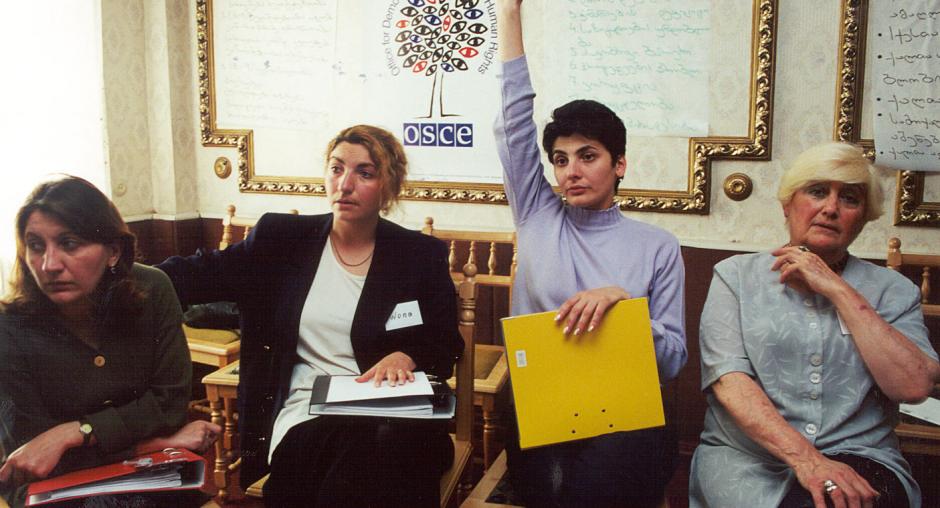Newsroom
OSCE to organize planning session on women right's awareness in Kazakhstan
ALMATY 4 December 2001

The OSCE Office for Democratic Institutions organizes regular workshops aimed at increasing women's rights awareness. (OSCE) Photo details
ALMATY, 3 December 2001 - The OSCE Office for Democratic Institutions and Human Rights (ODIHR) and the OSCE Centre in Almaty continue implementing a "Women's Rights Awareness" project in Kazakhstan. A marathon planning session - a "Planathon" - will take place from 4 to 7 December in the Kazahk capital, Almaty.
President Nazarbaev reinforced Kazakhstan's national policy in his speech at the Forum of the Women of Kazakhstan on 23 November. He said that the share of women in political bodies should be increased to 52 per cent, to reflect the proportion of women in the population. This is in line with the "National Action Plan for the Improvement of the Status of Women in the Republic of Kazakhstan", agreed in 1999.
Participants at the "Planathon" are representatives of State structures, leaders of local non-governmental organizations, women active in politics, journalists and representatives of international organizations. Its purpose is to produce a plan of action for the future, with an emphasis on the next parliamentary elections scheduled for 2004, and help to bring cohesion among everyone in Kazakhstan who is working on women's political empowerment. The long-term objective is to achieve a political arena where women and men work in equal partnership in decision-making and in developing the future of Kazkahstan.
The event will be facilitated by Lesley Abdela, senior partner in consultancy. She played an important role in increasing women's representation at the United Kingdom House of Commons, having spearheaded in 1980 the bipartisan Group 300 that campaigned to secure the presence of more women in the country's legislative bodies.
The project is being conducted in close co-operation with the National Commission on Family and Women's Affairs under the President of Kazakhstan. In the year 2000 to 2001, around 200 so-called mini-seminars were held in the framework of the project in a number of regions of Kazakhstan. About 4,000 women were trained. The women learned about their rights and how to defend them, but also about leadership skills and other countries' experience in ensuring more equal participation of men and women in politics.
President Nazarbaev reinforced Kazakhstan's national policy in his speech at the Forum of the Women of Kazakhstan on 23 November. He said that the share of women in political bodies should be increased to 52 per cent, to reflect the proportion of women in the population. This is in line with the "National Action Plan for the Improvement of the Status of Women in the Republic of Kazakhstan", agreed in 1999.
Participants at the "Planathon" are representatives of State structures, leaders of local non-governmental organizations, women active in politics, journalists and representatives of international organizations. Its purpose is to produce a plan of action for the future, with an emphasis on the next parliamentary elections scheduled for 2004, and help to bring cohesion among everyone in Kazakhstan who is working on women's political empowerment. The long-term objective is to achieve a political arena where women and men work in equal partnership in decision-making and in developing the future of Kazkahstan.
The event will be facilitated by Lesley Abdela, senior partner in consultancy. She played an important role in increasing women's representation at the United Kingdom House of Commons, having spearheaded in 1980 the bipartisan Group 300 that campaigned to secure the presence of more women in the country's legislative bodies.
The project is being conducted in close co-operation with the National Commission on Family and Women's Affairs under the President of Kazakhstan. In the year 2000 to 2001, around 200 so-called mini-seminars were held in the framework of the project in a number of regions of Kazakhstan. About 4,000 women were trained. The women learned about their rights and how to defend them, but also about leadership skills and other countries' experience in ensuring more equal participation of men and women in politics.
